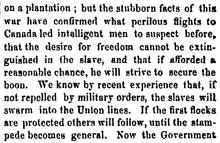THE FREEDOM PROCLMATION.
The deed is done. The assurance is given that an atrocious war, inaugurated for the aggrandizement of negro slavery, is to “plague the inventors” by the ending in the virtual annihilation of the institution. The National Government has recourse to an emancipation degree as the most effective weapon of war for the suppression of rebellion. It not only proclaims the freedom of the negro serfs, but announces its purposes to seek recruits among them for its garrisons and its ships of war. A few States and parts of States in which slavery exists are excepted from the operation of edict, by these are chiefly regions in which the institution cannot be maintained, save with the advantage of Southern market, and the loyal portion of their people will soon relief in compensative emancipation. All that portion of the South in which slavery is a vital, growing institution, is covered by the decree of freedom, while thousands of rebellious citizens in Missouri, Kentucky, Tennessee, and the excepted portions of Louisiana and Virginia, lose their slaves under eh operation of the Confiscation Act. We are justified, therefore, in asserting hat this proclamation is the death warrant of slavery in America.
It is natural that there should be inquiry as to the probable effect of the proclamation. Among the innumerable contradiction objections urged by the opponents of the measure, was the assertion that it would be an idle declaration, never reaching beyond the Union lines. It would be a suffice answer to say that we intended to extend the Union lines over all the South, ad with this proclamation, our armies will carry freedom wherever they go. But the rebels and their allies do not regard the measure as quite so barren of immediate consequence. Who told the slaves who awarded down o the beach at Port Royal, with their bundles prepare for departure, that Dupont’s fleet was manned by their friends? Why have the slaves flocked around the Union camp-sire in every military department in the South? EVERY Union army that has marched through the regions of rebellion, East or West, has been affectionately followed by fugitives from bondage. It was well enough years ago, in political contest, for the defenders of the brute theory of the negro to talk of the slave’s attachment to their master and ignorance of all things beyond his daily toil on a plantation; by the stubborn facts of this war have confirmed what perilous flights to Canada led intelligent men to suspect before, that the desire for freedom cannot be extinguished in the slave, and that if afforded a reasonable chance, he will strive to secure the boon. We know by recent experience that, if not repelled by military orders, the slaves will swarm into the Union lines. If the first flocks are protected other will follow, until the stampede becomes general. Now the Government has decided that the fugitives shall not only be protected, but receive into the national service. Thousands of black men will be armed and drilled for garrison duty on the Southern coast. Others will be employed as teamsters, laborers on intrenchments and as servants for officers. Still another class will be engaged in raising forage and other supplies for the army on the plantations that are now beneath our flag, thus serving an immense amount of money now expended for the purchase and transportation of these necessaries from the North. Thus we shall gain soldiers without drafting, and supplies at greatly reduced cost. These are the most obvious of the immediate effects of this measure. But it is equally plain that the shock given to the whole Southern system by which the rebellion is supported must be tremendous. Will servile insurrection result? That is the business of this in rebellion. Governor Pierrepoint, of Wester Virginia, in a brief, but cogent argument published soon after the September proclamation was issued, remarked upon this point:
It is also objected that the proclamation will produce insurrection, and the helpless will fall victims to slave violence. This is equally a fallacy: and the objector should remember that the rebel solider would be better engaged in protecting his wife and children from servile insurrection at home than slaughtering his brethren upon the battle filed. The only question for the president to decide was, whether he could hasten the close of the rebellion, re-establish the integrity of the Union, and save the lives of Union soldiers, by insuring the proclamation or withholding it. It was his business to look after the saving of the lives of the soldieries who had patriotically one to this battle field to put down the rebellion- to return them speedily to their parents, wives and children.
If the slaves, now declared free, seek to gain the Union lines and are resisted, the rebels will doubtless call such attempts “servile insurrections,” and exhibit their usual ferocity in hanging or burning those negroes who may be captured. There is more to be apprehended on this score than from the demonstration of unarmed men who have been subdued by the lash. If the fear of outrage at home compels the rebels to return to their plantations and to stop slaughtering our white brethren, that is so much additional gain for the Union cause.
We do not know the decree of emancipation. Necessary as a war measure, it is radiant with intrinsic justice. Potent, crushing as a weapon for the suppression of the rebellion, and complete and appropriate as the punishment of a guilt and bloodthirsty aristocracy, it is also a noble guarantee of a future for the country in which Liberty and Union will be one and inseparable.
"The Freedom Proclamation," Sacramento (CA) Daily Union, January 6, 1863, p. 5.

